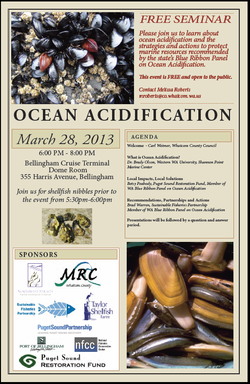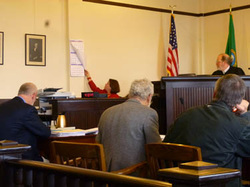
If there's one thing the public should join hands and reject, it's the injustice of blatant character assassination.
WWU Professor Emeritus, Dr. Don Easterbrook, a qualified and engaged local PhD (a lifelong scientist, not a dotty relic) has come under direct personal attack in the press and academia because his cause is only scientific truth. He dared to share information and raise questions about the adjustment of original data in testimony to a Washington State legislative panel last week. He urged legislators to make policy but with eyes wide open, not eyes wide shut. Now for his sins, it's open "shoot the messenger" season on Dr. Easterbrook. WE see that the press is loving every minute of it. You may have heard this saying in the press, "If it bleeds, it leads." The knives are out, and a truth-seeker is getting bloodied, and the sharks are in on the kill.

WWU's first staff quote in the press about Dr. Easterbrook's testimony was cited as coming from a WWU "geology faculty position statement" which the AP had in hand the very same day. Now folks, that was quicker than a Jack Rabbit on a date, as the old saying goes. WWU knew and cared enough to be that prepared? What possible beef would this august temple of science and learning have with anybody sharing data with legislators? This first "geology faculty position statement" wasn't linked to the AP Olympia release, but WE'll try to obtain it. Here's the AP text that was published nationwide:
Western Washington University's geology faculty said in a position statement that they concur with rigorous, peer-reviewed assessments by the National Academies of Science, the National Research Council and the Intergovernmental Panel on Climate Change that global climate has warmed significantly and that human activities — mainly greenhouse-gas emissions — account for most of the warming since the middle 1900s.
"I think it's unfortunate that someone who really isn't an active expert in their field is being chosen to discuss this important topic," said Bernie Housen, chairman of Western Washington University's geology department.
"By WWU GEOLOGY FACULTY — COURTESY TO THE BELLINGHAM HERALD"
This chest-beating "submission" is loaded with ad hominem* attack and politically charged spit, such as a claim that [Sen. Ericksen] “chose instead to, apparently, appeal to a narrow partisan element with his choice of speaker.” The faculty position rants a steady stream of derogatory characterizations of the scientist's work and integrity, while aggrandizing their own position and insisting their methods are so unimpeachable that the actual source data needn't be discussed. ("Pay no attention to that man behind the curtain" ring any bells?) Then it ends with incensed guidance to legislators and the public that critics of establishment processes and the status quo harbor “conspiracy-based ideas.” (You'll find the scathing Herald item in its entirety here.)
Now - WE ask - who in their right mind would dare raise questions in such a hostile academic environment? A person with courage and integrity might. But the message from these academics is clearly, "Don't dare to question ~." Real peer-review could result in jeer review, of you.*
WE expect that Dr. Easterbrook would reel from the suggestion that he's a modern Galileo Galilei. He seems like a straightforward man who has simply questioned data and process. But WE have observed punishing intolerance and attacks of the person, and the fervor does warrant comparison to prior inquisitions. (Other highly-qualified experts have been battered in the Whatcom environs; Easterbrook's not entirely alone.) WE feel their pain.
A little tutorial on how critics are bloodied:
Character assassination is a deliberate and sustained process that aims to destroy the credibility and reputation of a person.
Agents of character assassinations employ a mix of open and covert methods to achieve their goals, such as raising false accusations, planting and fostering rumors, and manipulating information.
*An ad hominem attack (Latin for "to the man" or "to the person"), is short for argumentum ad hominem, is an argument made personally against an opponent instead of against their argument.
Ad hominem circumstantial points out that someone is in circumstances such that they are disposed to take a particular position. Ad hominem circumstantial constitutes an attack on the bias of a source. This is fallacious because a disposition to make a certain argument does not make the argument false.
The circumstantial fallacy applies only where the source taking a position is only making a logical argument from premises that are generally accepted. Where the source seeks to convince an audience of the truth of a premise by a claim of authority or by personal observation, observation of their circumstances may reduce the evidentiary weight of the claims, sometimes to zero.
In contrast, the wise know:
If this bashing bothers you, what can you do? Let the attackers (WWU, its Geology Faculty and the press) know exactly what you think of it. It's low, and what's really disturbing is the thought that the world will miss critically important truths when messengers get hammered to a bloody pulp.
Write to:
President WWU: Bruce Shepard
WWU: Stephanie Bowers
WWU: Jeff Wright
Editor: Bellingham Herald (Q - What's fair & balanced?)


















 RSS Feed
RSS Feed
